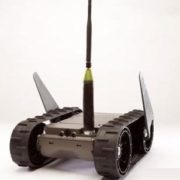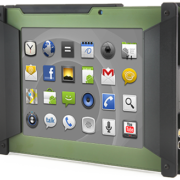LOS ANGELES (April 25, 2019) – The trusted provider of rugged biometric tablets, AMREL, announces that it will exhibit its newest integration of Suprema ID’s BM-Slim2 fingerprint sensor and optical scanner this month at Connect ID 2019, Suprema ID Booth #411. The world’s slimmest FAP20 optical sensor has been successfully integrated into AMREL’s 8-inch and 10.1-inch tablet models.
MilDef Group Acquires AMREL’s ROCKY Product Line
For Immediate Release
Los Angeles, CA (September 28, 2016) – On September 8, MilDef Group completed the acquisition of the rugged product lines of American Reliance, Inc. (AMREL®). Located in El Monte, California, AMREL’s Computer Division has been a long-standing, key player in the rugged computers market, providing COTS, modified COTS, and customized rugged solutions to Defense, Industrial, and Public Safety sector for the past 30+ years. With this acquisition, MilDef assumes AMREL’s role and will continue to market, sell, and service AMREL’s clientele with its complete range of rugged products’ portfolio.
Edward Chen, CEO of AMREL Group, states, “MilDef and AMREL have been partners for over two decades and this acquisition is a natural fit and the synergy is apparent. MilDef Inc. will carry on AMREL’s legacy under its MilDef brand name in the North and South American region and continue providing our valued customers exceptional service and support after the acquisition. AMREL Computer Division will focus its effort on mobile biometric product line to provide secure and reliable products to global homeland security.”
“The US is an important market for MilDef and this acquisition allows us to further strengthen our position within that market. MilDef and AMREL have a long standing relationship so this feels like a natural step to take. The synergies after the acquisition will provide long term benefits for all parties and this is also in line with our international expansion strategy.” says Tomas Odelid, CEO MilDef Group.
The acquisition will not impact AMREL’s other businesses and customers. For further information, contact:
Tomas Odelid, CEO, MilDef Group, +1 571 290 1333, +46 705 250029, tomas.odelid@mildef.com.
Edward Chen, CEO, American Reliance, Inc., +1 626 443 6818, edwardc@amrel.com.
About MilDef
MilDef Group consists of MilDef AB and MilDef Systems in Sweden, MilDef Limited in the United Kingdom, MilDef Inc in the United States and MilDef AS in Norway. MilDef develops, manufactures and sells rugged computers and special electronics to customers in the defense sector. Our portfolio consists of a complete range of rugged IT products, fully customizable. For more information, visit www.mildef.com
About AMREL
Founded in 1985, American Reliance Inc. (AMREL®) core business has been in industrial power and rugged computer business, providing programmable power supplies, electronic loads, test equipment, and rugged computers to Industrial, Public Safety, and Defense sector. After the turn of the century, it expanded its business to capture emerging market trends and opportunities to include Renewable Energy and Medical.
With the recent acquisitions of its initial core businesses, AMREL Group will shift its focus on clean energy, medical, and biometrics business. For more information, visit www.amrel.com.
AMREL announced that it is launching two new lines of rugged mobile network communication equipment: HalfRack 19” and FullRack 19”.
“AMREL is mostly known for its mobile rugged computing solutions,” explains Kalvin Chen, AMREL’s Vice President of Operations. “Our tablets, laptops and handhelds have been used for over 30 years by warfighters around the world.
“Working with multiple rugged mobile IT equipment suppliers can be a challenge for our clients. To simplify procurement and technical hurdles in development and system integration, we have greatly expanded our offerings. Our goal is to provide one-stop convenience by supplying an unusually extensive line of rugged mobile network communication equipment.”
Equipment in AMREL’s HalfRack 19” line are fully rugged and fully functional, but only ¼ the size of normal rack-mounted devices. This compact form factor saves space, reduces heat, and decreases energy use. The HalfRack 19″ line includes switches, routers, network attached storage, VoIP, video matrix, and PDU.
AMREL is also supplying the rack-mounted, full-sized FullRack 19″ line. These fully rugged products include servers, computers, all-in-one, Cisco-based switches, routers, IP-phone, firewall, and KVM.
Both HalfRack 19” and FullRack 19” lines are designed to operate in the most challenging environments. They both fully comply with military’s ruggedness standards, including MIL-STD 810, MIL-STD 461, and MIL-STD 1275D. There is also an option for TEMPEST SDIP-27 Level A, B, or C.
In addition to the HalfRack 19” and FullRack 19” lines, AMREL is offering rack-mounted rugged displays, mini keyboards, power distribution unit, power supplies, accessories, and other peripherals.
See the updated product lines at: computers.amrel.com/rugged-mobile-network-equipment.
Come Look at AMREL’s Latest & Greatest!
AMREL will be at AUSA demonstrating some of our newest and most popular products. This is an opportunity to see first hand these remarkable rugged computer platforms as well as discuss possible solutions with our experts.
- ROCKY RS11 Laptop Lightest, thinnest, fully rugged laptop in the world
- ROCKY RF10 Laptop Only fully rugged laptop with 7.1”display
- ROCKY DK10 Tablet Big 12.1” screen, powerful i7 processor & sunlight readable
- Flexpedient® AT80 Tablet Find out why everyone is talking about this versatile, lightweight, rugged Android tablet
- ROCKY DB6 Handheld World’s smallest fully rugged computer with Windows 7
- 19″/2®Rugged Networks & Servers Fully functional, but only ¼ size of standard rack unit
For more information, call (800) 882-6735
Ask to talk to one of our Sales Engineers
[layerslider id=”31″]
While researching an article on the Defense budget, I came across these two charts.
Source: Council of Foreign Relations
Intellectually, I knew that we had dramatically scaled down our involvement with Iraq and Afghanistan, but I didn’t fully appreciate how much until I saw these two charts. Sure, we’re still very much involved in the Middle East, and we may still get drawn back even further, but as of right now, major American combat operations in that part of the world are a shadow of what they were.
While it is great news that our soldiers are not in harm’s way as much as they were, those involved in maintaining counter-IED capabilities may be wondering about their fate. Are counter-IED personnel, programs, and equipment to be put on the shelf until the next land war? Joint Improvised Explosive Device Defeat Organization (JIEDDO) has expressed concerned about its ability to preserve the valuable skills developed during recent conflicts.
This is a problem that affects other capabilities besides counter-IED. During peace time we can’t maintain a factory producing a wartime-level of helicopters. However, if war breaks out, we don’t want to waste time training workers, developing supply lines, and building the factory. NDIA has a nice summary of the challenges of Maintaining a Viable Defense Industrial Base.
[layerslider id=”31″]
Those involved in counter-IED efforts may not face this dilemma. IEDs are a civilian, not just a military problem. Public safety and security agencies will need assistance from those who have counter-IED skills and equipment. The article below, which is excerpted from Fierce Homeland Security, discusses this phenomenon.
Improvised explosive devices aren’t just a significant threat to soldiers on the battlefield, but they’re also a leading killer of civilians worldwide, Interpol’s secretary general said this week in a news interview in Australia where the first-ever international forum to counter such threats was held.
“For instance, we have had more than 10,000 civilian casualties just this year around the world,” said Jürgen Stock, during a Sept. 3 radio interview with the Australian Broadcasting Corp.
He said IEDs are the “weapon of choice” for terrorists and other criminals and a leading killer of civilians. “So it’s really a global threat and what we need is a better information sharing between the military and law enforcement,” he added.
Almost three weeks ago, an improvised explosive device, or IED, killed 20 people at a popular Hindu shrine in central Bangkok, Thailand. More than two years ago, two brothers detonated an IED during the Boston Marathon that killed three people and injured hundreds more.
Stock said that the Internet has made it easier for terrorists and others such as so-called lone wolves – individuals acting alone in attempting to or committing terrorist acts – to put together such bombs.
Interpol, the international criminal police organization that’s based in France, co-hosted the Sept. 2-4 international conference along with Australian law enforcement and defense agencies to develop or enhance information sharing about IEDs and training capabilities among police and military personnel.
In the radio interview, Stock also talked about the role his organization is playing against foreign terrorist fighters. Many governments worldwide are concerned about their nationals traveling to conflict zones in Syria and Iraq to join the terrorist fight there as well as learn bomb-making skills that they can use to commit terrorist acts when they return to their home countries.
Stock said there are currently 25,000 such fighters from more than 100 countries that have joined the conflict zones and terrorist groups like the Islamic State of Iraq and Syria.
He said Interpol is building global platforms and databases to share information about these individuals with its 190 member states. One database contains 5,000 profiles of these fighters while there are other databases that include fingerprints, DNA material, and lost, stolen and forged identity or travel documents such passports.
He said it’s important that these databases and tools are available and accessible to border security agents and police agencies.
[layerslider id=”31″]
Unmanned systems are performing more and more important functions. Robots are active in IED detection, farming, surveillance, medicine, elder care, and hitchhiking.
That last one is a bit of mystery to me. What is the “important function” of a hitchhiking unmanned system? To tell tedious, pointless stories on long, boring trips? Crash on your couch? Hit you up for a handout?
Evidently, hitchBOT is some kind of social experiment that explores human-robot interactions. A relatively simple machine, it has a GPS tracker, a camera that takes a picture every 20 minutes, and the capability for simple conversation. It has successfully traveled through Germany and Netherlands, as well as from Nova Scotia to British Columbia.
However, when it got to the US, foul play ensured. Despite the claims put forward in a fake video, culprits are unknown.
The fact that someone thought it would be fun that to vandalize an innocuous robot should not be too great a surprise. After all, there are numerous stories of soldiers becoming attached to their Unmanned Ground Vehicles (UGV). UGVs are given names, accorded rank, nominated for medals, taken fishing, and even rescued at great risk to their human companions. If robots can be objects of affection, why not hostility?
[layerslider id=”31″]
In fact, hitchBOT’s experience is consistent with a Japanese experiment in which children attacked a UGV in a mall. The robot in the Japanese experiment was able to successfully learn avoidance behaviors that decreased its chances of abuse.
There is some speculation that the violence inflicted by the children reflected stages of moral development as well as their attitudes towards animated non-living objects (as someone who has taught third grade, I can testify that children are perfectly willing to kick and hit living adults as well as robots).
Lest you think all of humanity is a reservoir of unredeemable hostility, the creators of the hitchBOT has been inundated with messages of sympathy as well as offers of support for a rebuilt version. Whether the hitchBOT will once again roam the highways has yet to be determined.
To learn more about the hitchBOT, watch the video below.
 AMREL is providing unprecedented opportunities for VARs and resellers to distribute Flexpedient® AT80 rugged, Android tablets.
AMREL is providing unprecedented opportunities for VARs and resellers to distribute Flexpedient® AT80 rugged, Android tablets.
“This is a big deal,” declared Javier Camarillo, AMREL’s Senior Application Engineer. “We have structured the reseller program to make it as easy and profitable as possible.”
Unlike many reseller agreements, there is no required minimum order, and no complex legal agreements.
“We keep it dead simple,” he explained. “The typical reseller should be pleased with the no-hassle arrangement as well as the healthy profit margin.”
The Flexpedient® Android AT80 tablet was designed to appeal to the typical end-user. Lightweight and boasting the popular Android operating system, it has demonstrated an appeal beyond the usual rugged markets.
“Typically, only the military and First Responders buy rugged computers, which are more durable than commercial systems,” explained Mr. Camarillo. “Recently both consumers and enterprises have expressed interested in rugged systems. In the long run, ruggedness saves money due to reduced repair, lost work, and replacement costs.”
“We have received inquiries from scientists who want them for collecting field data in remote locations,” stated Mr. Camarillo. “Folks want it for aviation applications. Oil & Gas companies like its impressive IP 67 rating, as well as its lightweight mobility.
“Since it is easily modified, product developers have been calling us. A major league baseball club has bought the biometric version to help manage events at their park. This is a great opportunity for an aggressive reseller.
“One reseller described us as the Humvee of rugged tablets, because we are transferring military products to the industrial and commercial markets. Just like the Humvee, we are offering Flexpedient® AT80 rugged tablets in a variety of colors. We also offer engraved custom logos for companies interested in promoting their brand.”
Standard features include Android 4.3 (Jelly Bean), 8” 10-point multi-touch capacitive touchscreen display, front/back 5 MP cameras, 802.11 b/g/n, GPS, Bluetooth®.
To learn about the Flexpedient ® AT80 and VARs/reseller program,
contact Javier Camaillo at: (800) 882-6735 or javierc@amrel.com
Get a sneak peek! AMREL will show off its new rugged Android tablets & handheld devices at this year’s SOFIC!
AMREL will feature a preview of some its newest, most advanced rugged computing solutions including:
- Android/Windows solutions, such our new Android handhelds.
- Super-slender laptops, such as the ROCKY RV11 the thinnest, rugged laptop on the market that has a 15.6” display.
- Powerful handheld & tablets, including our new Flexpedient Android tablet.
We customize, design, prototype, and deliver solutions faster than anyone
Learn more at: computers.amrel.com
AMREL will be displaying its latest and greatest at MCB Camp Pendleton on Tactical & Tech Day, Wednesday, April 22, 2015. We will be showcasing our line of super-slim, ultra-rugged laptops, handhelds, and tablets.
Special sneak peak! Come and get a look at some of our special products before they’re released to the market, including:
- AT80 Rugged Android Tablet
- DS11, a tablet so thin you won’t believe it’s fully rugged
- Many others
Also, on hand will be the RS11 and the RV11, the world’s thinnest, rugged laptops with 13.3″ and 15.6″ displays, respectively. And you won’t want to miss our Android APEX AH53 handheld, so tough it has an IP67 rating.
Learn more about our rugged mobile computing solutions at: computers.amrel.com
An Unmanned Underwater Vehicle (UUV) braved the hostile Antarctic seas to give us a view of the underside of sea ice. When combined with satellite and other data, this should produce the first 3-D map of Antarctic sea ice.
Read the scientific paper here and/or watch the Reuters video below. (Warning-short ad before the video)
American Reliance, Inc.
789 N Fair Oaks Ave,
Pasadena, CA 91103
Office Hours
Monday-Friday:
8:00 am – 5:00 pm PST
Saturday: Closed
Sunday: Closed
Main: +1 (626) 482-1862
Fax: +1 (626) 226-5716
Email: AskUs@amrel.com
Blog Posts
Mobile Biometric Solutions
Mobile Biometric Smartphones & Tablets
BioFlex S® Commercial Smartphones
BioSense AT80B | 8″ Android Biometric Tablet
BioSense PA5 | 10.1″ (Gen 2) Android Biometric Tablet
BioSense PA5 | 10.1″ Android Biometric Tablet
BIOPTIX PM3B | 7″ Windows Biometric Tablet
BIOPTIX PM5B | 10.1″ Windows Biometric Atom Tablet















